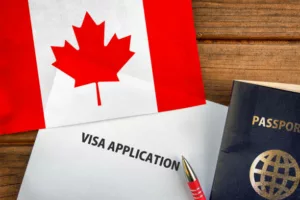How to Immigrate to Canada Without Travel Agents 2024 – Pathways and Strategies to Immigrate Independently
Are you interested in migrating to Canada? Then you should read this article on how to immigrate to Canada without travel agents.
Immigrating to Canada without a travel agent can be a daunting task, but it is possible. In this article, we will walk you through the step-by-step process of how to immigrate to Canada without travel agents, including how to choose the right immigration program, gather the required documents, and complete the application form.
What advantages come with immigrating to Canada?
Moving to Canada as a job seeker offers numerous perks. The nation is celebrated for its high standard of living, encompassing top-notch healthcare, educational prospects, and a low crime rate. Moreover, Canada boasts a robust economy with lucrative employment options, making it a prime destination for residence and work.
Steps to take before migrating to Canada
Before you migrate to Canada, it’s crucial to undertake thorough preparations. Here are some essential steps to get ready for your move:
- Research Canadian Residency Requirements: Gain a comprehensive understanding of the residency and immigration requirements in Canada, including the specific visa or immigration program that suits your situation.
- Compile Necessary Documentation: Create a checklist of all the essential documents you’ll need for your move, such as your passport, driver’s license, insurance papers, and any paperwork mandated by Canadian immigration authorities.
- Budget and Timeline: Establish a budget for your migration expenses and create a timeline outlining when everything is in order. This planning will help you stay on track with your preparations.
- Packing and Personal Items: Begin packing your belongings, ensuring you have enough clothing and personal items to last for at least six months. Additionally, set aside some funds for unexpected expenses that may arise during your initial period in Canada.
- Understand the Healthcare System: Familiarize yourself with the Canadian healthcare system. It may differ from what you’re accustomed to, but it’s essential to have adequate health coverage while living in Canada.
- Language Proficiency: While English is the official language in Canada, be aware that many Canadians also speak French or other languages at home. Consider improving your language skills, as it can enhance your communication and integration into Canadian society.
- Get Organized: Having a well-structured plan in place will help minimize stress during the pre-migration phase and facilitate a smoother transition. Keep track of important dates, tasks, and deadlines to ensure a successful move to Canada.

Steps to Take to Immigrate to Canada Without Travel Agents for Work
1. Research the Canadian Job Market:
Before embarking on your job search, it’s vital to conduct thorough research on the Canadian job market. Familiarize yourself with the demanding industries, the skills employers seek, and the regions with ample job prospects. This knowledge will enable you to tailor your job search and concentrate on areas where you’re more likely to succeed.
2. Polish Your Resume and Cover Letter:
Crafting a compelling resume and cover letter is crucial to make a favorable impression on potential employers. Customize your resume to highlight relevant skills, qualifications, and experiences that align with the Canadian job market. Incorporate industry-specific keywords and effectively showcase your accomplishments. Your cover letter should be personalized for each application, demonstrating your interest in the company and the value you can bring to the role.
3. Utilize Online Job Search Platforms:
Online job search platforms are a valuable resource for finding employment opportunities. Websites like Indeed, LinkedIn, and Monster are widely used in Canada and can assist you in locating relevant job listings. Employ advanced search filters to narrow down options based on location, industry, and job level. Set up job alerts to receive notifications for new openings that match your criteria.
4. Leverage Professional Networking Sites:
Building a robust professional network can significantly boost your job search. Create a LinkedIn profile and connect with professionals in your desired field. Engage in industry-specific groups, participate in discussions, and showcase your expertise. Networking can lead to hidden job opportunities and valuable connections with hiring managers or recruiters.
5. Tap into Local Resources:
In addition to online platforms, explore local resources and organizations that can support your job search. Visit government employment centers, attend job fairs, and participate in networking events in your community. These resources can offer valuable insights, guidance, and even direct job leads.
6. Prepare for Job Interviews:
Once you start receiving interview invitations, thorough preparation is essential. Research the company extensively, anticipate common interview questions, and rehearse your responses. Highlight your skills and experiences that align with the job requirements. Additionally, familiarize yourself with Canadian workplace culture and etiquette to demonstrate your adaptability.
7. Understand the Work Permit Process:
If you are a foreign national seeking employment in Canada, it’s important to grasp the work permit process. Research the various types of work permits available and identify the one applicable to your situation. Familiarize yourself with the requirements, application procedures, and processing times. The Government of Canada’s official website is an excellent source for detailed information on work permits.
8. Maintain Persistence and Positive:
Securing a job can be a time-consuming process, especially when navigating it without an agent. It’s crucial to remain persistent, motivated, and positive throughout your job search journey. Don’t be disheartened by rejections; instead, continue refining your job search strategies. Networking, attending industry events, and continually upgrading your skills can significantly increase your chances of success.

How to immigrate to Canada without travel agents 2023/24 – Travel route to Canada
1. Express Entry: Canada’s Premier Immigration Pathway
The Express Entry Program is a key Canadian immigration initiative designed to facilitate the entry of skilled workers into the country. This system enables Citizenship and Immigration Canada (CIC) to actively assess, recruit, and select immigrants with the necessary skills and qualifications under federal economic immigration programs. These programs include:
- Federal Skilled Worker Program (FSWP)
- Federal Skilled Trades Program (FSTP)
- Canadian Experience Class (CEC)
Furthermore, the Express Entry program allows individual provinces and territories to leverage the system for recruiting suitable candidates, aligning with their specific labor market needs as part of the Provincial Nominee Programs.
With the introduction of the new National Occupational Classification (NOC 2021), 16 fresh occupations have become eligible for Express Entry consideration via the Federal Skilled Worker Program. This expansion embraces a wide array of professionals, from truck drivers and nurses to teaching assistants and payroll administrators, thereby broadening the scope of Canada’s mass entry immigration stream.
Additionally, this year introduces occupation-specific draws within the Express Entry system. Canada has recently implemented legal amendments to target specific economic labor shortages. These specialized draws are set to commence in the near future, providing even more tailored opportunities for prospective immigrants.
READ ALSO: 6 Best Informatica Jobs in Australia for 2024
2. Provincial Nominee Program: A Robust Path to Canadian Immigration
The Provincial Nominee Program (PNP) has gained increasing popularity as a pathway for immigration to Canada. Several Canadian provinces, including Alberta, Ontario, British Columbia, and others, have established their own immigration programs under the PNP umbrella, often providing a fast-track process for qualified candidates. However, it’s important to note that PNP categories typically require that applicants reside in the respective provinces after their arrival in Canada. Additionally, most PNPs necessitate a job offer from a Canadian employer to qualify.
Here are some of the prominent Provincial Nominee Programs in Canada:
- Alberta Immigrant Nominee Program (AINP)
- British Columbia Provincial Nominee Program (BCPNP)
- Manitoba Provincial Nominee Program (MPNP)
- Newfoundland and Labrador Provincial Nominee Program (NLPNP)
- New Brunswick Provincial Nominee Program (NBPNP)
- Nova Scotia Provincial Nominee Program (NSPNP)
- Northwest Territories Nominee Program (NTNP)
- Ontario Immigrant Nominee Program (OINP)
- Prince Edward Island Provincial Nominee Program (PEI PNP)
- Quebec Skilled Workers Program (QSWP)
- Saskatchewan Immigrant Nominee Program (SINP)
In 2023, the Provincial Nominee Program (PNP) takes center stage as the economic stream that rivals, and even surpasses, the Express Entry system in scale and scope.
Canada has ambitious plans to embrace over 105,000 newcomers through the nine provincial and two territorial immigration programs. This comprehensive approach covers a vast geographical expanse, from British Columbia in the west, traversing the prairie provinces of Alberta, Saskatchewan, and Manitoba, to Ontario, and extending to the Atlantic Canadian provinces of Nova Scotia, New Brunswick, Newfoundland & Labrador, and Prince Edward Island.
These programs offer myriad opportunities for those seeking Canadian immigration in 2023. Moreover, specific streams within the PNP framework align with Express Entry, enabling the provincial programs to seamlessly integrate with the federally-operated selection system.
Each province is well-prepared to select immigrants based on their distinct economic needs, emphasizing occupation lists and streams tailored to those unique priorities. Prospective candidates are encouraged to consult these lists and streams diligently, as provincial and federal priorities may diverge, ensuring a tailored approach to their immigration journey.
3. Quebec’s Unique Immigration Landscape
Quebec is a distinct entity within Canada, enjoying full autonomy over its economic immigration intake. A strong emphasis on the French language characterizes the province’s approach to immigration.
Under the leadership of Francois Legault, the head of the Coalition Avenir Quebec, there is a concerted effort to ensure that all immigrants welcomed into Quebec are proficient in French. This emphasis on the French language is seen as a crucial element in preserving Quebec’s unique culture. As part of this vision, the provincial government aims to control the total number of newcomers to the province, targeting around 50,000 in total, with 33,000 of them entering through economic immigration programs.
It’s important to note that the francophone requirement becomes less stringent for candidates holding a qualified job offer in hand, reflecting Quebec’s recognition of the economic value of skilled immigrants.
The outcome of Legault’s policy, which focuses on limiting immigration, is still uncertain, especially given the backdrop of a chronic labor shortage in the province. Following a significant electoral victory last year, primarily driven by votes from outside Montreal, Legault is now faced with the challenge of revitalizing Quebec’s economy to maintain his popularity and meet the demands of the labor market.
4. Family Class
Family reunification holds a central position in Canada’s immigration policy, allowing families in Canada to sponsor their relatives for permanent residency. To be eligible as a sponsor, you must be a Canadian citizen or a permanent resident. Eligible individuals for sponsorship typically include your spouse and children under the age of 22, although some exceptions may apply.
It’s important to note that sponsoring your parents or grandparents is not currently an option under the standard sponsorship program. However, there is an alternative avenue available for bringing parents and grandparents to Canada, which is the Super Visa Category. This option allows parents and grandparents to visit and stay in Canada for extended periods, facilitating family connections while not constituting permanent residency sponsorship.
- Spouses, Partners, and Children
Within Canada’s Immigration Levels Plan, a significant portion is dedicated to spouses, partners, and children, aiming to welcome 78,000 newcomers in 2023, which constitutes the majority of the 106,000-strong Family Class.
The Spouse and Partner stream allows for applications from individuals both outside and within Canada, facilitated through the Spouse or Common-Law Partner in Canada Class. Notably, this stream is open to spouses and partners of any gender, provided they meet the necessary requirements.
Spouses and partners awaiting the processing of their applications can also qualify for a work permit, enabling them to work during this period.
Children sponsored under this category are typically under the age of 22 and do not have a spouse or partner of their own. To be eligible for sponsorship beyond the age of 22, they must demonstrate an inability to financially support themselves due to a mental or physical condition, or they must have relied on their parents for financial support since before turning 22.
Canada operates a distinct stream for overseas adoption, catering to those seeking to bring adopted children into the country.
- Parents and Grandparents
Canada’s Parents and Grandparents Program operates on a lottery-based system, where potential sponsors declare their interest in a pool and are selected at random to receive invitations to apply for immigration.
In 2023, Canada plans to welcome 28,500 newcomers through this program. The Parents and Grandparents Program has faced ongoing controversy due to its consistent oversubscription. Authorities have continually sought fair methods for selecting candidates to join their families in Canada.
Notably, the PGP pool has not been opened for new sponsors since 2020. While three batches of sponsors have been invited to apply since then, there is the possibility that Immigration, Refugees and Citizenship Canada (IRCC) may open a new window for the submission of interest to sponsor forms in 2023.
For parents and grandparents who are not selected through this program, the Super Visa is a viable alternative to consider.

SEE ALSO: 12 Reasons Why You Should Take Transportation Jobs in Australia
Specific Requirements to Immigrate to Canada Without Travel Agents
Immigrating to Canada involves meeting specific requirements that vary depending on the immigration program you apply for. The Canadian government sets distinct criteria for each program. To determine your eligibility and prepare a successful application, you should:
- Choose the Right Immigration Program:
– Start by selecting the immigration program that aligns with your qualifications, background, and goals. Popular programs include Express Entry, Provincial Nominee Programs (PNPs), Family Class, and more. Each program has unique eligibility criteria.
- Verify Your Eligibility:
– Review the specific eligibility requirements for the chosen immigration program. This may include age, education, work experience, language proficiency, and adaptability. Ensure you meet these requirements before proceeding.
- Gather Required Documentation:
– Prepare the necessary documents to support your application. Typical documents may include proof of employment experience, educational credentials, identification, and records of your criminal and medical history. The specific documents vary based on the chosen program.
- Language Proficiency:
– Language proficiency, usually in English or French, is essential for most immigration programs. You may need to demonstrate your language skills through standardized tests like IELTS or CELPIP for English, or TEF for French.
- Medical Examination:
– Many immigration programs require a medical examination to ensure that you are in good health. This examination is typically conducted by an approved panel physician.
- Criminal Background Check:
– You may need to provide a police clearance certificate from your home country or countries where you have lived. This is to demonstrate that you have no criminal convictions that would render you inadmissible to Canada.
- Proof of Funds:
– Some immigration programs, especially those in the Express Entry system, may require you to demonstrate your ability to financially support yourself and your family upon arrival in Canada.
- Application Submission:
– Once you have gathered all the required documentation, you can proceed with submitting your application through the relevant immigration program. Carefully follow the instructions and pay the necessary fees.
It’s crucial to thoroughly research the specific program you wish to apply for and ensure that you meet all eligibility requirements. Consulting with an immigration expert or using online tools provided by the Canadian government can help you determine the best program for your immigration goals and navigate the application process effectively.
Are There Alternative Paths to Immigrate to Canada?
Yes, there are several alternative routes to obtain Canadian immigration, each with its own set of requirements. It is crucial to confirm your eligibility before commencing the application process.
The specific documentation needed varies depending on the immigration program you select. To determine the documentation required for your chosen program, it is essential to first identify the most suitable immigration program for your circumstances.
Common Canadian Immigration Programs
- The Canadian Experience Class (CEC):
– The CEC is an immigration program that allows individuals who have worked in Canada for at least one year to apply for permanent residency.
- Humanitarian and Compassionate Application:
– Humanitarian and Compassionate Applications (H&Cs) are submitted from within Canada and cater to individuals without legal status in Canada who consider Canada their home.
- Refugee Claims:
– Individuals can make refugee claims at a Canadian port of entry or at an inland CBSA or Immigration, Refugees and Citizenship Canada (IRCC) office, provided they can demonstrate why they cannot return to their home country.
- Atlantic Immigration Pilot Program:
– The Atlantic Immigration Pilot Program (AIP) is designed to recruit newcomers to Canada’s Atlantic provinces, including New Brunswick, Nova Scotia, Prince Edward Island, and Newfoundland and Labrador. These provinces can address labor shortages by admitting immigrants with the necessary work experience.

SEE ALSO: Jobs in Canada without education and work experience 2023/24
Helpful Resources
- Immigration, Refugees and Citizenship Canada (IRCC).
- Provincial Nominee Programs (PNPs)
- Canada Border Services Agency (CBSA)
Official Immigration Forms
- IRCC Forms: You can obtain immigration application forms and guides directly from the official IRCC website.
- MyCIC: Utilize the MyCIC tool to conveniently track the status of your application online.
Helpful Resources
- Canada.ca Immigration and Citizenship Community: Participate in a community of fellow applicants, immigrants, and experts to seek guidance and support.
- Settlement Services: Discover the range of settlement services available in Canada to aid in your smooth transition.
- CanadaVisa Forum: An internet-based forum where you can connect with fellow applicants to share and discuss your immigration experiences.
- Prepare for Life in Canada: An online platform offering pre-arrival information and settlement services.
Conclusion on How to Immigrate to Canada Without Travel Agents
Canada offers a diverse range of immigration programs, each with its unique requirements and pathways. To successfully immigrate to Canada, it’s essential to choose the right program that aligns with your qualifications, gather the necessary documentation, and meet the eligibility criteria. Whether you opt for Express Entry, a Provincial Nominee Program, family sponsorship, or other immigration routes, Canada’s welcoming and diverse society awaits newcomers from around the world.
While the immigration process may appear complex, seeking guidance from a Canadian immigration lawyer can help streamline your application and navigate the various requirements. Canada is renowned for its openness to immigrants, and once you become a permanent resident, you can enjoy a high quality of life, access to social services, and the opportunity to contribute to the vibrant Canadian society.
As you embark on your journey to Canada, it’s important to remember that the path to immigration is a personal and unique one. Whether you are seeking economic opportunities, reuniting with family, or escaping hardship, Canada’s immigration programs offer a welcoming embrace to individuals from all walks of life. With careful preparation and the right program, your dreams of making Canada your new home can become a reality.
Frequently Asked Questions (FAQs) on How to Immigrate to Canada Without Travel Agents
- Can I secure a job in Canada without the assistance of an agent?
– Absolutely! Many individuals successfully find employment in Canada without hiring an agent. Utilize online platforms, networking, and local resources to explore job opportunities.
- How can I improve my chances of finding a job in Canada without an agent?
– To enhance your prospects, research the job market, customize your resume and cover letter, use online job search platforms, connect with professionals, access local resources, and maintain persistence in your job search.
- Are there specific work permit requirements for foreign nationals?
– Yes, foreign nationals must understand work permit requirements and processes. Various types of work permits are available, so it’s crucial to determine the one applicable to your situation. The Government of Canada’s official website offers detailed information.
- Is it advisable to attend networking events in Canada?
– Attending networking events in Canada can be highly beneficial. It provides opportunities to connect with professionals in your field, explore job prospects, and gain insights into the local job market. Networking can lead to discovering hidden job opportunities.
- How long does it typically take to find a job in Canada without an agent?
– The time required to find a job in Canada varies based on factors like the job market, industry, your qualifications, and networking efforts. Persistence and continuous refinement of your job search strategies are important.
SEE ALSO: Tile setter helper Jobs in Canada 2023/24 – Hiring Now!
